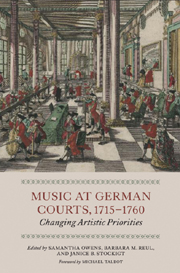Book contents
- Frontmatter
- Contents
- List of Tables
- Foreword
- Preface
- Editorial Notes
- Notes on Contributors
- List of Abbreviations
- 1 ‘Das gantze Corpus derer musicirenden Personen’: An Introduction to German Hofkapellen
- KINGDOMS AND ELECTORATES
- DUCHIES
- PRINCIPALITIES AND PRINCE-BISHOPRICS
- LANDGRAVIATES AND MARGRAVIATES
- 12 The Court of Hesse-Darmstadt
- 13 The Court of Baden-Durlach in Karlsruhe
- 14 The Court of Brandenburg-Culmbach-Bayreuth
- 15 ‘Die vornehmste Hof-Tugend’: German Musicians' Reflections on Eighteenth-Century Court Life
- Index
15 - ‘Die vornehmste Hof-Tugend’: German Musicians' Reflections on Eighteenth-Century Court Life
from LANDGRAVIATES AND MARGRAVIATES
Published online by Cambridge University Press: 12 September 2012
- Frontmatter
- Contents
- List of Tables
- Foreword
- Preface
- Editorial Notes
- Notes on Contributors
- List of Abbreviations
- 1 ‘Das gantze Corpus derer musicirenden Personen’: An Introduction to German Hofkapellen
- KINGDOMS AND ELECTORATES
- DUCHIES
- PRINCIPALITIES AND PRINCE-BISHOPRICS
- LANDGRAVIATES AND MARGRAVIATES
- 12 The Court of Hesse-Darmstadt
- 13 The Court of Baden-Durlach in Karlsruhe
- 14 The Court of Brandenburg-Culmbach-Bayreuth
- 15 ‘Die vornehmste Hof-Tugend’: German Musicians' Reflections on Eighteenth-Century Court Life
- Index
Summary
AS MUCH AS THE EXTANT RECORDS of German Hofkapellen tell us about courtly musical life during the eighteenth century, they tend to provide only the official view of musicians' experiences: a decree is handed down, a violinist hired or dismissed, a grievance filed, a judgement rendered, and so on. That we know comparatively little about how court musicians regarded their duties, colleagues, and surroundings should not be surprising, given that most were understandably hesitant to speak candidly about the environment in which they earned their living, and thereby risk offending an aristocratic, noble, or royal employer. Yet a variety of their writings – including personal letters, autobiographies, theoretical treatises, and even novels – offer valuable, if fleeting, glimpses of Hofkapelle life as seen from the musician's perspective. The following survey focuses on six noteworthy court musicians active between the last quarter of the seventeenth century and the third quarter of the eighteenth: Wolfgang Caspar Printz (1641–1717), Johann Beer (1655–1700), Johann Kuhnau (1660–1722), Georg Philipp Telemann (1681–1767), Johann Georg Pisendel (1687–1755), and Johann Joachim Quantz (1697–1773). Printz, Beer, and Kuhnau all penned novels that are either about musicians or contain scenes featuring them; Printz, Beer, Telemann, and Quantz left us exceptionally informative autobiographies; and Pisendel provided unusually frank assessments of the Dresden Hofkapelle in his surviving correspondence with Telemann.
- Type
- Chapter
- Information
- Music at German Courts, 1715–1760Changing Artistic Priorities, pp. 413 - 426Publisher: Boydell & BrewerPrint publication year: 2011

